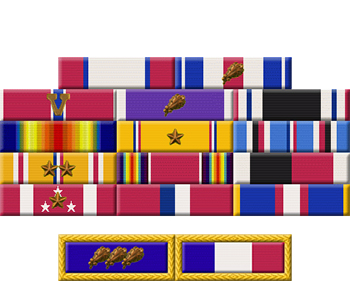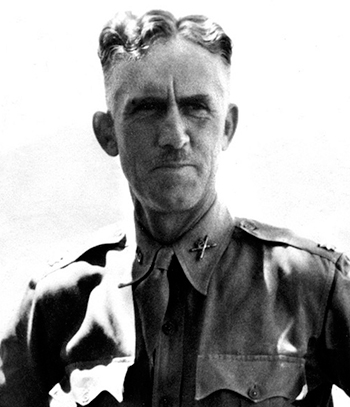
|
Nicoll F. Galbraith |
 |
|||
| Rank, Service | ||||
Colonel O-6, U.S. Army |
||||
| Veteran of: | ||||
|
||||
| Tribute: | ||||
Nicoll Galbraith was born on May 18, 1896, in Williamsport, Pennsylvania. He enlisted in the U.S. Army on April 25, 1917, and served with the 14th Cavalry Regiment at Del Rio, Texas, from April 1917 to April 1918, and then at Fort Sam Houston, Texas, from April to May 1918. Galbraith then attended Officer Training School, and was commissioned a 2d Lieutenant of Field Artillery on August 17, 1918. World War I ended before he was able to be shipped overseas, and he was honorably discharged at Camp Jackson, South Carolina, on December 6, 1918. After serving for 2 years in the Army Reserve, Lt Galbraith went back on active duty beginning on September 12, 1920, serving as a Field Artillery Officer. He attended the Battery Officers Course at the Field Artillery School at Fort Sill, Oklahoma, from September 1927 to June 1928, and he then served as Assistant Professor of Military Tactics with the Army ROTC unit at the University of Chicago from 1928 to 1934. During this time he completed his Bachelor's Degree in Political Science at the University of Chicago from September 1930 to March 1933. Lt Col Galbraith attended Command and General Staff School at Fort Leavenworth, Kansas, from September 1939 to February 1940, and he was then assigned as Commander of Battery A, 24th Field Artillery (Philippine Scouts) in the Philippines from February to November 1940. His next assignment was as Assistant Deputy Chief of Staff (G-4), U.S. Army Forces in the Far East, on Bataan from November 1940 to March 1941, followed by service as Assistant Deputy Chief of Staff (G-4), United States Forces in the Philippines on Corregidor from March 1941 until he was taken as a Prisoner of War by the Japanese upon the fall of Corregidor on May 6, 1942. Col Galbraith was held as a POW in the Philippines, on Formosa, in Japan, and in China before being repatriated in Manchuria in September 1945. After returning to the United States, he attended POW Orientation courses at The Infantry School from January to June 1946, at the Field Artillery School in July 1946, and at the Anti-Aircraft Artillery School from July to August 1946. Col Galbraith was medically retired from the Army on May 1, 1950, and died on February 23, 1986. He was buried at the Chapel of Our Saviour Columbarium in Colorado Springs, Colorado. His son, Whitney Galbraith, wrote the book Valley of the Shadow, which details his father's account of American POWs of the Japanese. |
||||
|
||||

